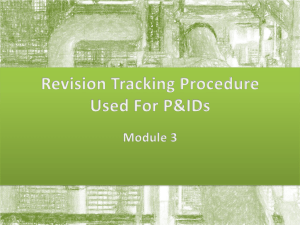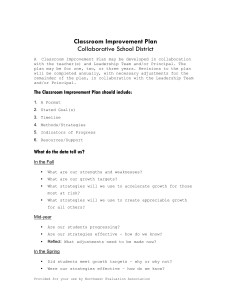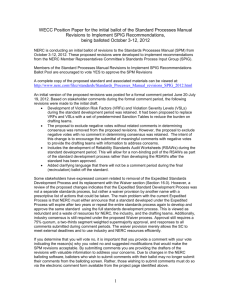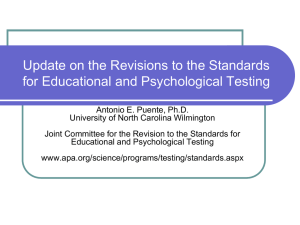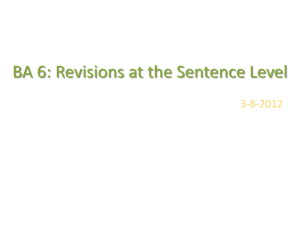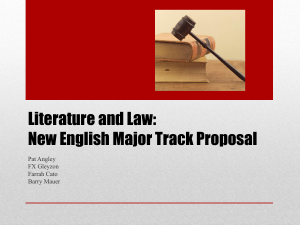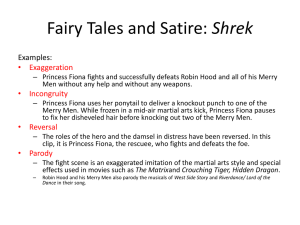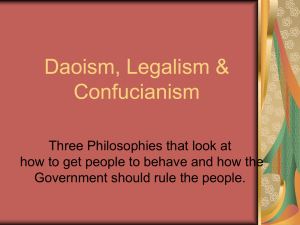1001027-英文命題技巧
advertisement
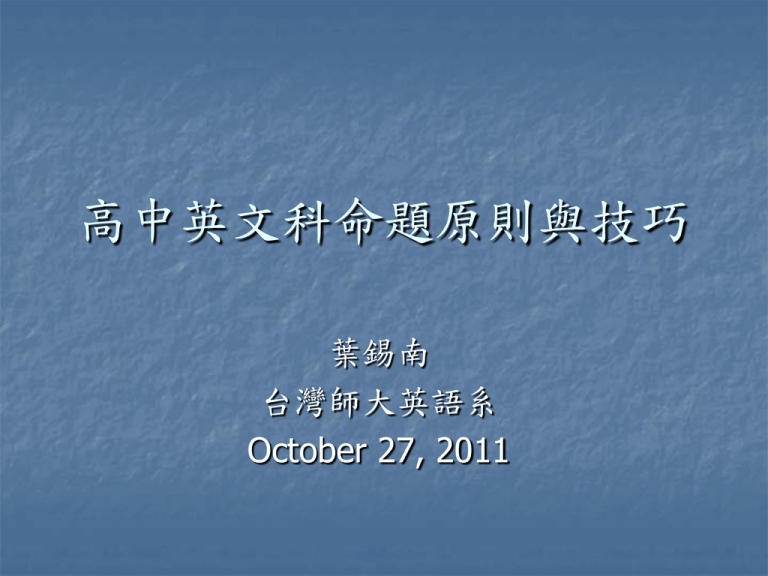
高中英文科命題原則與技巧 葉錫南 台灣師大英語系 October 27, 2011 命題一般性原則 1/2 一、符合英語科課程綱要基本能力指標﹙or 教材內容﹚ 二、兼顧單項式語言成份與整合式語言能力 三、聽說讀寫並重 入學加考? 四、語言使用時的精確性與流利度並重 五、選材力求生活化、多樣化 命題一般性原則 2/2 六、題型合理具效度﹙建構效度與內容效 度﹚ 七、各大題配分合宜 八、命題以實用、思考性為原則,避免艱深 冷僻者 九、試題的認知層次﹙記憶、理解、分析、 整合、引申推理等﹚做合理的分配 聽力測驗命題技巧 1/2 一、每一大題需詳細說明題數、答題方式,並附例 題。 二、題目依難易度,由簡而難依序排列。 三、語意為考試重點,不考艱深的字彙或句型結構。 四、儘量考句意或篇章的整體了解,不考細節。 五、詞彙用字以教科書為範圍。 六、取材內容符合學生的生活體驗及認知範圍。 七、題目內容不宜偏重記憶或繁複的計算。 八、題幹不宜太長,但須提供足夠的答案線索。 聽力測驗命題技巧 2/2 九、各選項宜簡單、明暸、語法正確並具誘答力。 十、不宜與題幹之用詞或結構雷同。 十一、正答與其它選項之字數、長短不應相差太大。 十二、正答與其它選項難度要接近。 十三、對話者身分及情境要清楚明確。 十四、對話應至少包含三句,以助內容密切連貫。 十五、圖片的繪製力求生動活潑。 十六、圖片的重點應清楚,背景不宜太複雜。 聽力測驗試題內容 1. 單音、語調的辨認﹙較適合作為練習而非 正式測驗﹚ 2. 單字的辨認 3. 單句語意的了解 4. 短文或對話語意的了解 5. 了解短文或對話,並做適當的回應 6. 語調或重音的溝通功能 聽力測驗常見題型 1. 單字辨識﹙單字單獨出現、在句子 中﹚ 2. 對話。 3. 根據圖意選句子 4. 聽句子選圖 5. 文意理解 ﹙對話或短文﹚ 6. 語調與重音 聽力示例 閱讀理解測驗命題技巧 一、字彙題 (詳見下方 p. 18)。 二、綜合測驗 (詳見下方 p. 32) 。 三、(短文)閱讀測驗(詳見下方 p. 43) 。 閱讀理解測驗內容 1. 常用單字、片語的意義與用法 2. 常用句子的意思 3. 對話、短文、故事的情節 4. 書信、請柬的內容 5. 常用圖表、表格的內容 閱讀理解測驗題型 1. 字彙題 -- 選擇、選填﹙word bank﹚、﹙填空 ﹚ 2. 片語題 3. 翻譯題 -- 英文翻譯成中文 4. 類比題 -- A : B = C : D 5. 對話式填空 6. 綜合測驗 ﹙cloze test﹚ 7. 文意選填 -- 子句或句子 8. 配對題 -- 以子句或片語為單位,進行句子的 9. 段落式重組題 -- 以句子為單位 書寫測驗命題技巧 一、題型多樣化,由易到難,靈活變化。 二、以學過的詞彙、句型及語法為主。 三、字填空題的題幹部不宜過短,題意必須清晰、 明確。 四、簡答題之圖片、問句、短文必須清楚明確。 五、翻譯、寫作試題力求周延,能確切測試學生是 否熟悉不同時態、句型、子句或常用語。 六、翻譯、寫作試題的題意必須明確,用句務必正 確、自然,必要時應給予適當之提示。 書寫測驗常見類型 1. 字彙題 -- 填空式 2. 克漏字﹙cloze test﹚-- 填空式 3. 翻譯題 -- 中文翻譯成英文︰單句式、連貫 式、段落填空式 4. 句子合併、改寫 5. 造句 6. 簡答題/問答題 -- 根據短文、圖表 7. 短文寫作 示例 字彙題命題技巧 一、命題所用之詞彙應以高中常用之字詞為 原則。 二、所測詞彙之詞類應適當的分配 (3-3-2-2 或 4-3-2-1) 三、題幹的上下文語意應明確,提供充分的 解題線索。提供線索的方法見附件。 四、題幹長度適中﹙以20字或不超過一行半 為原則﹚ 五、正答與其它選項之長短及難易應相近。 六、選項應具有適度之誘答力。 綜合測驗題命題技巧 1/2 一、選文應多元,涵蓋不同主題及題材 。 二、選文的內容及語言難易適中。 三、選文應符合學生的生活經驗及認知 範 圍。 四、選文應具教育性、知識性及趣味性 。 五、選文長度與空格數比例適當,每題約 綜合測驗題命題技巧 2/2 六、上下文應提供足夠的解題線索,並避免 以首尾句命題。 七、命題重點在文意的了解及篇章的概念, 如虛詞﹙代名詞、介詞、冠詞、連接詞 等﹚、慣用語及轉折詞等;同時可兼顧 語法。避免拼字、用語或文法錯誤之不 當選項。 八、選項詞類一樣,避免根據文法常識即可 作答。 九、選項具適度之誘答力。 閱讀測驗命題技巧 1/2 一、選文應多元,涵蓋不同之主題及題材。 二、選文的內容及語言難易難易適中。 三、選文應符合學生的生活經驗及認知範圍。 四、選文應具教育性、知識性及趣味性。 五、選文長度與命題數之比例應適當。﹙約 50~60字一題﹚ 六、命題應避免學生不用閱讀選文即可作答。 七、命題應測試學生對短文的理解、引申及 閱讀測驗命題技巧 2/2 八、命題應兼顧整體 (global) 理解與 局部 (local) 理解。 整體理解:文章主旨、作者態度、對象(場合)、引申 指涉 局部理解:根據上下文猜字義、尋找同義字、代名詞指 涉 (referent) 九、命題應儘量避免使用與選文完全相同之 字詞及句型。 十、命題應平均涵蓋選文的重要內容。 詞彙題示例 單字題 1. The dictionary is very _______ to a language learner. (86.工.4) (A) funny (B) angry (C) useful (D) harmful (E) nervous 2. He will forgive you because he is a very _____ man. (A) persuasive (B) realistic (C) reasonable (D) sensitive 詞彙題示例 3. To me, Mandarin songs just sound like very, very sincere emotional expressions, and my _____ include Lo Ta-yu’s “Love Song 1980” and Chang Hung-liang’s “Do You Know I’m Still Waiting for You?” (A) likeness (B) dislikes (C) favorites (D) primers 4. A: Next Thursday is my birthday. I’ll have a party. Will you come? B: But I have an _____ class. (A) science (B) piano (C) English (D) math 詞彙題示例 5. A: John takes Mike’s money without asking him. B: It’s _____. (A) fashionable (B) comfortable (C) interesting (D) illegal 6. A: Did you see the baseball game last night? B: Yes, it was really _____. (A) exciting (B) excited (C) interesting (D) interested 詞彙題示例 7. A: I’m happy because all the tests are _____. B: OK. Let’s see the answers of them. A: Oh! No. (A) end (B) over (C) finish (D) dead 8. Although he is a chef, Roberto _____ cooks his own meals. (A) rarely (B) bitterly (C) naturally (D) skillfully 詞彙題示例 9. Movies, sports and reading are forms of _____. They help us relax. (A) entertainment (B) advertisement (C) tournament (D) commitment 10. Michael Jackson’s albums are _____ here in Taiwan. You can get them at many bookstores and record shops. (A) available (B) reliable (C) sensible (D) adoptable 詞彙:片語題示例 1. Most people _____ the saying that honesty is the best policy, but very few can put it into practice. (86.商.12) (A) are family with (B) are familiar with (C) is familiar with (D) are familiar to 2. _______ him, it now takes minutes to receive a copy of a document in the distance. (88.商) (A) Thanks to (B) Thanks for (C) Coming up with (D) Referring to 詞彙:片語題示例 3. The boy in the city _______ Nature’s strength when first going to the beach. (88.商.24) (A) put off (B) cut into (C) took off (D) was struck by 4. A: _____. Where’s 7-11? B: It’s on the corner. (A) Excuse me. (B) You’re welcome. (C) I’m sorry. (D) Hello. 詞彙:片語題示例 5. With over fifty teams competing in the tournament, all the games will be played ________. (A) eye to eye (B) head to toe (C) hand to mouth (D) back to back 6. Did I say “a lot of dime”? Oh, I’m really sorry. I meant to say “a lot of time.” It was a ________. (A) slip of the tongue (B) thorn in my side (C) penny for your thoughts (D) leap in the dark 詞彙題:命題適切性檢查表 ______1.所測試之詞彙(含選項)是否為常用之 實詞? ______2.題幹的上下文語意是否明確?是否提供 充分的解題線索? ______3.題幹長度是否適中(在20字以內)? ______4.正答及各選項字母數及難易是否相近? ______5.正答與各選項詞類是否相同? ______6.正答及各選項難易度是否相近? ______7.選項誘答力是否平均? 對話題示例 1. Helen:Oh! I lost my keys. Adam :___________ (88.工.21) (A) Too bad. (B) Why not? (C) Good for you. (D) Don’t bother. 2. Waiter: May I take your order, sir? Henry:_________ (87.工.30) (A) Yes, I’ll have fried chicken. (B) Thank you very much. (C) Yes, I want the first one. (D) Yes, here you are. 對話題示例 Nick: Hello, is this 763-3790? Doris: No, it’s not. It’s 762-2790. Nick: ___________________ (A) Oh, yes. (B) Oh, is it? (C) Oh, I’m sorry. (D) Oh, that’s right. 對話題示例 Sam: Mom, this is Pete. This is Linda. ________ Pete and Linda: How do you do, Mrs. Chen. Mrs. Chen: How do you do? (A) She is my friend. (B) He is my classmates. (C) They are my friends. (D) They are great. 對話題示例 Peter: I went to the Mandarin Restaurant last night. Jim: Really? How was it? Peter: Terrific. ______ (A) It was the worst meal I’ve ever had (B) It was the best meal I’ve ever had. (C) I didn’t like it (D) It was very expensive 對話題命題適切性檢查表 ______1.是否符合測驗目標(語意、語用、英美習 俗、基本應對禮儀)? ______2.身份、情境是否清楚? ______3.是否至少三句,以助內容密切連貫? ______4.情境是否自然流暢合乎常情? ______5.內容是否符合考生之生活體驗及認知範圍? ______6.正答是否明確唯一,不會引起爭議? ______7.正答與選項之字數長度是否不會相差太多? ______8.正答與選項的難度是否接近? ______9.選項是否具有誘答力? 綜合測驗示例 People in different countries look at time differently. In some countries being on time and 1 everything by exact time is very 2 . In other countries people are more 3 about time. It doesn’t matter if someone is late. 4 fact, people might 5 it rude if you are exactly on time. (87.商) 綜合測驗示例 1. (A) organizing (C) organ 2. (A) importance (C) important 3. (A) relax (C) relation 4. (A) To (C) On 5. (A) consider (C) considerate (B) organization (D) organize (B) importantly (D) import (B) relaxed (D) relaxation (B) At (D) In (B) considerable (D) consideration 綜合測驗示例 Today’s robots are like babies 31 with future generations. It is impossible 32 imagine what the next generations will be like. It is possible that they will 33 change life in 34 societies. The students of today must be sure that these changes are good. Robots must improve, not harm, the 35 of human life. (87.商) 綜合測驗示例 31. (A) compare (C) comparison 32. (A) for (B) in 33. (A) complete (C) completely 34. (A) industry (C) industrial 35. (A) quality (C) quit (B) compared (D) comparative (C) at (D) to (B) completed (D) completion (B) industrialize (D) industrialist (B) qualify (D) qualified 綜合測驗示例 Teachers of English who want to be responsible yet realistic about teaching usage and mechanics to today’s writing students face a chronic 11 . What should our priorities be? Should we insist that we distinguish between lie and lay or sit and sat, and that we use a singular pronoun after everybody? If we do, we risk 12 as if we 13 the posture of the protectors of pure English 14 the barbarians who will corrupt the language if we relax our 15 . On the other hand, if we take the attitude that 16 students to generate content and organize it in a coherent pattern should be our major goal 17 surface features are comparatively unimportant, we open ourselves 18 from readers who are genuinely 19 good English. There are people who 綜合測驗示例 11.(A) matter (B) instruction (C) dilemma (D) failure 12.(A) looking (B) to look (C) in looking (D) for looking 13.(A) presume (B) regard (C) are assuming (D) are having 14.(A) turning off (B) holding off (C) calling off (D) taking off 15.(A) care (B) watch (C) vigilance (D) attention 16.(A) help (B) helping (C) be of help to (D) in helping 17.(A) and which (B) that (C) which (D) and that 18.(A) for attack (B) with attack (C) to attack (D) on attack 19.(A) concerned about (B) concerned to (C) concerned in 綜合測驗示例 A good teacher is many things to many people. I suppose everyone has his definite idea about 1 a good teacher is. As I 2 back on my own experience, I find the teacher that I respect and think about the most are those who demanded the most 3 from the students. I think of one teacher in 4 that I had in high school. I think he was a good teacher because he was a very strict person. He just 5 no kind of nonsense 6 all in his classroom. I remember very vividly a sign over his classroom door. It was a simple sign that 7 , “laboratory--in this room the first five letters of the word 8 , NOT the last seven.” In other 9 , labor for him was more important than 10 . 綜合測驗示例 1.(A) how (B) that (C) who (D) what 2.(A) figure (B) figured (C) look (D) was looking 3.(A) discipline (B) disciprine (C) dissepline (D) disipline 4.(A) peculiar (B) particular (C) curio (D) curiosity 5.(A) endure (B) intoliet (C) tolerated (D) toils 6.(A) at (B) after (C) in (D) to 7.(A) told (B) spoke (C) said (D) talked 8.(A) is stressed (B) put stress (C) emphasize (D) are emphasized 9.(A) mind (B) words (C) opinion (D) hands 10.(A) absords (B) library (C) auditory (D) oratory 綜合測驗示例 Suppose __1__ some morning you __2__ awake in a place you have never __3__ before; everything is new __4__ you. Around you __5__ a strange field, __6__ unfamiliar creatures __7__ in __8__. You see objects which you do not recognize, and hear sounds which you __9__ interpret. __10__ would you do? 綜合測驗示例 1. 2. 3. 4. 5. 6. 7. (A) why (B) about (C) what (D) that (A) might (B) could (C) would (D) should (A) gone (B) been (C) to (D) went (A) to (B) on (C) in (D) over (A) are (B) have (C) is (D) has (A) have (B) with (C) as (D) being (A) moving (B) having moved (C) moved (D) move 8. (A) it (B) there (C) where (D) them 9. (A) would not (B) need not (C) cannot (D) should not 10. (A) When (B) Where (C) Who (D) What 綜合測驗命題適切性檢查表 ______1.是否符合測驗目標? ______2.各選文是否有不同主題、風格、體裁? ______3.選文是否兼顧教育性、知識性及趣味性,並配合學生的生 活、學習經驗與認知能力? ______4.選文的難易是否適中? ______5.是否避免以首尾句命題? ______6.每個空格是否有足夠解題線索? ______7.測試重點是否整體理解與局部理解並重,並兼顧語意及語 法? ______8.選項是否避免拼字、用詞或文法錯誤? ______9.選項是否避免爭議性或不適當的誘答? _____10.選項誘答力是否平均? 閱讀測驗示例 For two thousand years, Confucius was canonized as China’s First and Supreme Teacher. This is a cruel irony. Of course, Confucius devoted much attention to education but he never considered teaching as his first and real calling. His true vocation was politics. He had a mystical faith in his political mission. (88. 商.54-56) 閱讀測驗示例 54. According to the passage, what might Confucius be most interested in? (A) Politics. (B) Teaching. (C) Faith. (D) Vocation. 55. The word “calling” in the third sentence is synonymous with ______ (A) attention. (B) vocation. (C) education. (D) mission. 閱讀測驗示例 56. What does the cruel irony in the passage refer to? (A) Confucius devoted himself to education; therefore, he was canonized as China’s First and Supreme Teacher. (B) Although Confucius was concerned about education, he didn’t devote much attention to it. (C) Teaching was not considered a good job, so Confucius chose politics as his real occupation. (D) Confucius has been recognized as a great teacher in spite of his full devotion to politics. 閱讀測驗示例 Every month we receive several boxes of books from our main office in Hong Kong. At the same time, they send us a list describing what they have sent us. We examine the contents of the boxes to see whether we have received all the books on the list. If everything is correct, we simply sign the list and return it to Hong Kong. If there is any difference between the description on the list and the books actually received, we write a letter explaining the difference and ask for confirmation of the list. 閱讀測驗示例 41. Books are received ______ (A) daily (B) weekly (C) monthly (D) yearly. 42. One thing we have to do with the books when we receive them is ______ (A) read them (B) list them (C) sign them (D) examine them. 43. The list is probably made ______ (A) in the main office (B) in the letter (C) in the boxes (D) in the books. 閱讀測驗示例 44. The contents of the boxes are probably ______ (A) books (B) the main office (C) letters and lists (D) a bookstore. 45. If no list were received, we would probably _____ (A) send the books back (B) write to Hong Kong (C) praise the main office (D) forget the whole 閱讀測驗命題適切性檢查表 ______1.選文內容是否具教育性、知識性、趣味性? ______2.選文內容是否符合考生的生活經驗和認知範疇? ______3.選文選文是否難易適中? ______4.選文長度與問題數目是否相配合? ______5.選文內容是否提供足夠新資訊,做為設計題目的依據? ______6.問題是否避免太常識性,不用閱讀選文即可作答? ______7.問題的設計是否以對文章的理解為考量? ______8.問題是否除一般理解外,還能測驗考生引申、推理的能力? ______9.各問題(及選項)的文字是否重新設計,而非與選文文字 完全相 同? _____10.各選項長度是否相近? _____11.各選項之難易度是否接近? 動動腦!!!﹖﹖﹖ Can you improve the item? The pants she is wearing look ____ . (A) mean (B) funny (C) polite (D) seat 動動腦!!!﹖﹖﹖ Can you improve the item? The child has a _____ for reading. He has learned lots of words since he was three years old. (A) star (B) life (C) send (D) talent 動動腦!!!﹖﹖﹖ Can you improve the item? Computers can’t solve all the problems we have. After all, they are just _____. (A) shoes (B) jokes (C) colors (D) mechines 動動腦!!!﹖﹖﹖ Can you improve the item? _____right away, I hate your big words (A) Color TV (B) Link up (C) Shut up (D) Show off 動動腦!!!﹖﹖﹖ Can you improve the item? The boy ___ black sweater looks nice. (A) in (B) on (C) with (D) of 動動腦!!!﹖﹖﹖ Can you improve the item? My ______ shoes was made in England, it cost $1500. (A) jog (C) jogging (B) jogged (D) joging 動動腦!!!﹖﹖﹖ Can you improve the item? Jacky : Linda is a girl. She gets along with people easily. Bob : That’s why she has so many good friends. (A) friendly (B) careful (C) important (D) special 動動腦!!!﹖﹖﹖ Can you improve the item? There are more and more caring about the pollution. It’s good. I believe our environment will be getting nicer. (A) people (B) person (C) foreigner (D) stranger 動動腦!!!﹖﹖﹖ What revisions are needed? Ryan: Hey, look! Who is ___(11)___? Carol: She is my mother. She is a ___(12)___ . Ryan: Wow! She is a singer. That’s cool. How about the man next to her? ___(13)___ is he? Carol: He is my ___(14)___. He is a police officer. Ryan: Wow! That’s cool, too. 動動腦!!!﹖﹖﹖ What revisions are needed? 11. (A) the boy (B) she (C) he (D) your father 12. (A) teacher (B) singer (C) doctor (D) police officer 13. (A) How (B) What (C) Who (D) Where 14. (A) sister (B) grandmother (C) father (D )mother 動動腦!!!﹖﹖﹖ What revisions are needed? Kelly: Hi, I’m Kelly. Nice to meet you. Joe: __(41)__ . __(42)__ Joe. Nice to meet you. Kelly: What is your __(43)__? Joe: I’m a __(44)___. Kelly: Great! Joe: And you? Kelly: I’m a teacher, __(45)__. 動動腦!!!﹖﹖﹖ What revisions are needed? 41. (A) Nice to meet you, Billy. (B) Nice to see you. (C) I’m fine. (D) Hi. 42. (A) This is (B) That is (C) You are (D)I am 43. (A) name (B) brother (C) job (D) father 44. (A) cook (B) singer (C) teacher (D) police officer 45. (A) too (B) and you (C) here (D) now Dialog items: What revisions are needed?? Mother: Martha, don’t you think it’s about time for you to __1__? Martha: But it’s only eleven __2__. Mother: Only eleven __2__? How late do you plan on __3__? Martha: I don’t know—__4__ I finish, I guess. Mother: Now when in the world __5__? Martha: Mom, __6__ love to go to bed, but we have three quizzes tomorrow, and I __7__ going over all the material. Mother: If you stay up __4__ you’ve finished all that, they’ll have to carry you to school on a stretcher. Martha: Please, Mom. If you keep talking to me about this, __8__ going to bed even later. Mother: All right, all right. But please, before midnight, OK? I don’t know __9__ you can do well on a test if you can’t even keep your eyes open. Martha: I’ll be OK. __10__, Mom. Dialog items: What revisions are needed?? 1. (A) go bed (B) go to bed (C) go to the bed (D) sleeping 2. (A) more or less (B) approximately (C) or so (D) about 3. (A) awakening (B) staying awakened (C) staying up (D) stay awake 4. (A) up through (B) after (C) since (D) until 5. (A) is that (B) will that (C) would that (D) will that be 6. (A) I (B) I’d (C) I had (D) I will 7. (A) don’t finish (B) am not finish (C) isn’t finished (D) haven’t finished 8. (A) I’ll have gone (B) I can be going (C) I would be going (D) I’ll end up going 9. (A) why (B) how (C) when (D) what 10.(A) Good evening (B) Good night (C) Good sleeping (D) Good-bye 動動腦!!!﹖﹖﹖ What revisions are needed? John is a boy of 6 years old, and his hobby is to see movies. His favorite movies are cartoon movies. He enjoys __26__ them very much. He never gets __27__ when he sees them. John __28__ Shrek 2 lately. In the movie, many interesting things happened. Shrek and her wife princess Fiona returned from honeymoon and visited Fiona’s parents. Fiona’s father didn’t like Shrek and asked Puss-In Boots to kill him. Shrek and Fiona did their best and tried to overcome(克服)difficulties. Finally, Fiona’s father accepted them. John asked her mom__29__ the DVD for him, because the movie is fun and meaningful. 動動腦!!!﹖﹖﹖ What revisions are needed? 26 (A) seeing (B) to see (C) see 27 (A) boring (B) bore 28 (A) see (B) saw 29 (A) to buy (B) bought (C) buying (C) bored (C) seen (D) not to buy (D) seen (D) bores (D) sees 動動腦!!!﹖﹖﹖ What revisions are needed? Ring....Ring...Ring...“Hi, this is Hess Bookstore. Sorry, we can not pick up the phone right now. Press(按)one to leave a message. Don’t forget(別忘了)to leave your name and your telephone number. We’ll call you back as soon as possible(儘快地). Please press two if(如 果)you would like (願意) to wait.” “Hello, this is Angel Huang. My phone number is 8522-2862. Please return(回)my phone. Thank you.”. 動動腦!!!﹖﹖﹖ What revisions are needed? 1. Who’s calling? (A) Bookstore. (B) Hess Huang. (C) Angel Huang. (D) Ring Huang. 2. To leave a message, what do you press? (A) 2 (B) 1 (C) 3 (D) 4 3. Angel pressed _____. (A) 2 (B) 1 (C) 3 (D) 4 4. What’s Angel’s telephone number? (A) Eight, five, double, two, eight, sixty-two (B) eighty- five, two, two, two, eight, six, two (C) eight, five, two, two, two, eight, two, six (D) eight, five, triple, two, eight, two, six 5. Angel is calling _____. 動動腦!!!﹖﹖﹖ What revisions are needed? Judy: I’ll go to see the exhibition(展覽) in the museum this afternoon after school. Will you come? Amy: Yes, I will. But where is the museum? Judy: It’s on Fifth Road next to the City Library. Amy: I see. I’m going to the post office now. I’ll meet you there at four o’clock. Judy: All right. I’ll see you there. 動動腦!!!﹖﹖﹖ What revisions are needed? 41. Where will Judy and Amy go in the afternoon? A. The police office. B. The post office. C. The library. A. The museum. 42. When will Judy and Amy meet? A. After interview. B. After school. C. After dinner. D. After work. 43. What is true about the museum? A. It opens at two o’clock. B. It’s on Third Road. C. It’s next to the library. D. It’s across from the police office. 44. Where is Amy going now? A. The police office. B. The post office. C. The supermarket. D. The library. 45. Where is the exhibition? A. In the museum. B. In the City Library. 動動腦!!!﹖﹖﹖ What revisions are needed? When you eat rice dumplings, who do you think of? The poor Chinese poet—Chi-Yuan(屈原)or White Snake(白蛇娘娘)? These two persons are famous. We often think of them on Dragon Boat Festival. I remembered there were many interesting things to do on Dragon Boat Festival when I was a little girl. I liked to eat rice dumplings. They were delicious. There were another two things we did at noon on that day. One was standing the eggs at 12 o’clock at noon. The other was washing our bodies with the Water at Noon.(午時水) The water could make our skin beautiful and healthy. I still like to celebrate Dragon Boat Festival now. 動動腦!!!﹖﹖﹖ What revisions are needed? 61. We usually stand the eggs _______on Dragon Boat Festival. (A) in the morning(B)at noon (C)in the evening 62. What can make our skin beautiful and healthy? (A) Rice dumplings.(B)Water at Noon. (C)Sachets. 63. We don’t think of ________ on Dragon Boat Festival. (A)Cupid (B)The Chinese poet--Chi Yuan (C)White Snake 動動腦!!!﹖﹖﹖ What revisions are needed? Rented A nice four-floor house with a garage, four bedrooms, three bedrooms, one dining room, one kitchen and one living room in the quiet neighborhood near Tainan City. It’s a furnished (附傢俱的) house. You are allowed to use the washing machine (洗衣機), sofa, air-conditioner (空調設備) and beds. P.S. 1. Welcome no-child couples (夫婦) and no pets. 2. Rent: NT$8,000 per-month. 動動腦!!!﹖﹖﹖ 1. What will be rented in this ad (廣告)? What revisions are needed? (A) A car. (B) A house. (C) A bike. (D) An apartment (公寓). 2. Who is the landlady? (A) Mr. Wang. (B) Mrs. Wang. (C) Mrs. Huang. (D) Mrs. Fuang. 3. What furniture (傢俱) can I use if I rent the house? (A) TV (B) Microwave oven (微波爐) (C) Washing machine (D) Hair dryer (吹風機) 4. How many bathrooms are there in the house? (A) Four. (B) One. (C) Two. (D) Three. 5. Who does the landlady like to rent the house to? (A) Single (單身的) people with a dog. (B) Married (已婚的) people with children. (C) Single people. (D) Married people without children and pets. Samples for hands-on practice: vocabulary items (senior high) 1. 2. 3. 4. 5. 6. expectation extension immature pose schedule (V) ban Samples for hands-on practice: cloze passage 1 (senior high) (Items 11-15) Hundreds of scientists around the world are researching how birds learn to speak. They have found that most birds learn new sound when they are young. The learning time for white-crowned sparrows is the first two-and-a-half months after they are hatched. Newly hatched birds are quiet, but they hear a rich variety of sounds from the adult birds around them. Soon they start to practice those songs at once, until their songs crystallize and are set in their memory for life. If the birds make a “mistake” while Samples for hands-on practice: cloze passage 2 (senior high) (Items 16-20) Register, or the degree of formality of a conversation, tells us information about the kind of relationship the speakers have. Many languages convey register through the use of different verb endings, different words for “you,” or the use of family names instead of given names when speaking to anyone other than family or closest friends. Because Americans tend to use given names, many learners of American English get the impression that American always speak informally. This impression, however, is false. American English, like other languages, has formal and informal speech, even if distinct formal or informal verb endings or special forms of “you” do not exist. Although Americans tend to use given names immediately, they may still speak somewhat formally with people they don’t know well, Samples for hands-on practice: reading comprehension 1 (senior high) I admire my friend Betty because she is self-assured and discriminating. Unlike some people I know, Betty has confidence in herself. She is not plagued with insecurity and self-doubt. Some people carry little monsters in their heads that tell them, “You’re no good. Stay in your hole and hang your head.” Not so with Betty. A happy little fairy lives in her head, and it says, “Hi, sweetie, glad you’re here. What can I offer you? Make yourself at home!” Betty is not so self-assured that she is arrogant, but she likes herself. As a result, it is a pleasure to be with her. She relaxes people because she does not lean on them neurotically for support. Her faith in herself is contagious. Her self-possession inspires others to be like her, and her appreciation of life spills over to her friends. Being confident probably helps Betty to be discriminating. She sees no reason to settle for second best, and she hardly ever does. Why spend an evening with boring people just to be with people? Why not spend an interesting evening at home alone? Why go to a bad play or sit in a bad seat to see a good one? Instead, wait for a good play and save money, if need be, to sit in a good seat. These are the choices Betty made. She prefers old friends to strangers or mere acquaintances, and she will do just about anything for her friends—short of making dinner for them, which she Samples for hands-on practice: reading comprehension 2 (senior high) Can you imagine fasting for an entire day, from dawn to sunset? Muslims all over the world do this, not just one day, but every day for a whole month. During Ramadan, not a sip of water, not a crumb of food passes their lips from sunrise to sunset. Fasting during Ramadan is to show obedience to Allah’s law, which, as revealed by Prophet Muhammad, will bring peace to the individual and balance to the society. It is just one of the five Pillars of Islam, the five things that every good Muslim does. The other Pillars of Islam are to recite the profession of faith; to pray five times a day; to pay zakat, which is a donation to the poor; and to perform, if possible, the hajj, or holy pilgrimage to the city of Mecca in the Kingdom of Saudi Arabia. As children grow up in the world of Islam, they first learn to pray five times each day. The next step they make in their faith is to fast. They may practice fasting when they are just five or six years old. Young children start off without eating breakfast, but they will have a snack when they come home from school. By the time they are nine or ten, Muslim children might fast a whole day at a time, even several days in a week, but they will probably not fast for the whole month. Then, when they turn eleven or twelve, they join their parents and older brothers and sisters in fasting every day during the month of Ramadan. Those who fast during Ramadan are rewarded for their obedience with a Samples for hands-on practice: Welcome To3-1 (senior high) reading comprehension The Mount St. Helens National Volcanic Monument Where To Start A good place to begin your visit is at one of the Monument’s visitor centers or information stations. Interpretive staff are available to answer your questions and help you plan your visit. Ask about the daily schedule of interpretive walks, talks and theater presentations that share the geologic, biologic, and cultural history of the area. The Mount St. Helens Visitor Center, Coldwater Ridge Visitor Center, and Johnston Ridege Observatory are open daily year-round, except for Thanksgiving, Christmas, and New Year’s Day. Information stations, as well as the Windy Ridge Viewpoint, are open daily mid-May through early fall. Seasons Most viewpoints on the Monument’s north, east, and south sides can be reached from Memorial Day until snow closes the roads, usually in late October. Trails are generally open from June through October, although some lower elevation trails can be hiked all year. Winter can be a beautiful time to visit Mount St. Helens. The Monument visitor centers are open daily, except winter holidays, and the Sno-Parks at Marble Mountain, Cougar, and Wakepish provide winter access for cross-country skiers and snowmobilers. Washington and Oregon Sno-Park permits are required to park your vehicle at a Sno-Park. Samples for hands-on practice: reading comprehension 3-2 (senior high) Services & Accommodations During the summer months, food service is available at the Coldwater Ridge Visitor Center on State Highway 504 and at Cascade Peaks Viewpoint on Forest Road 99. There are no overnight accommodations within the National Volcanic Monument. However, lodging, meals, gifts, supplies and services are available in many communities around the mountain. For more information, contact local Chambers of Commerce, tourist information centers and individual businesses.
